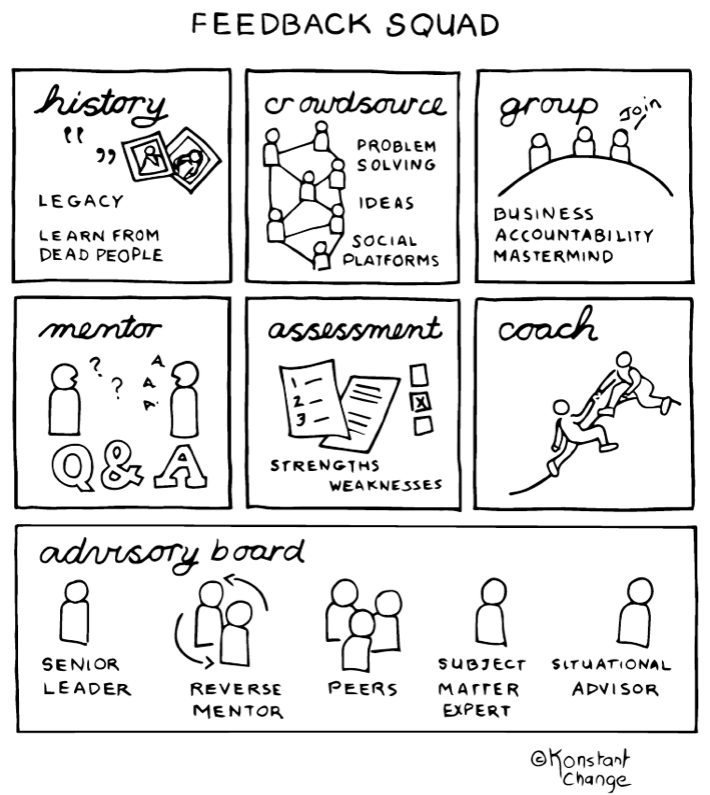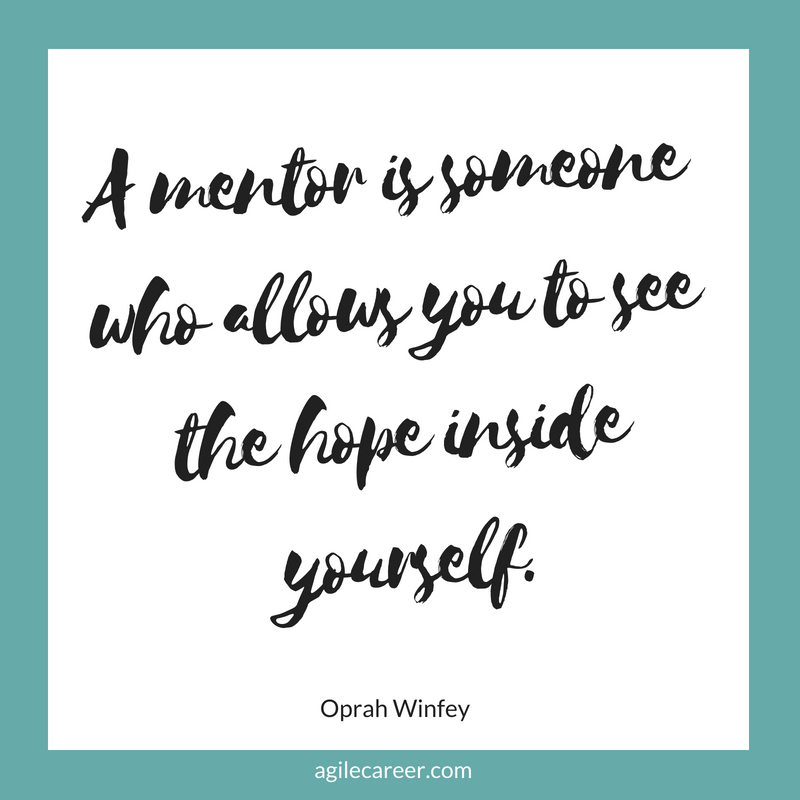
Feedback is a core activity of an agile career, but this helpful communication comes from a variety of sources.
It’s a myth that every worker has access to feedback from an experienced, veteran advisor. Someone who will mentor them through career decisions.
80% of global workers interviewed for Activate Your Agile Career: How Responding to Change Will Inspire Your Life’s Work did not have an official mentor throughout their career.
In today’s workplace, we need to instead build a feedback lab so we can proactively respond to change.
There are multiple ways you can access relationships and information, regardless of your lineage or station in life. The feedback loop is self-directed, giving you permission to soar among the ranks of MVPs, nudging the needle on the improvement dashboard.
8 Sources of Feedback to Help Your Career Flourish:

1. Learn from dead people
Take lessons from enlightened people who have gone before us, yet pondered similar questions. It’s a practical way to grab a burst of inspiration from books, passages, or researching quote themes online.
Doing so enables you to savor sage advice for a burdensome problem. Wisdom from famous philosophers, musicians, or family members dear to us, who have passed on, provides important perspective.
Examples:
“And suddenly you know…it’s time to start something new, and trust the magic of new beginnings.” —Meister Eckart
“Do one thing every day that scares you.” —Eleanor Roosevelt
“The best way to predict your future is to create it.” —Abraham Lincoln
2. Crowdsource feedback on social platforms
Quora, Facebook, Linkedin, and various crowdsourced platform sites afford each of us the opportunity to pose questions on a network of our peers. The curious effect of the crowd is people genuinely want to help others solve problems. I have witnessed an impressive generosity of input, as individuals try to make decisions for their careers or their businesses.
Asking for advice starts with open-ended questions. Like a skillful reporter, think of “who,” “what,” “where,” “when,” “how,” or “why” questions to get to reasons behind answers or to capture context. Only Use a yes / no or multiple choice approach when taking a poll, as in choosing between three design options for your personal website.
3. Participate in one or more groups
Want to obtain a fresh perspective and enrich the ramblings of your own mind? Join a group of like-minded individuals who want to grow and make things happen in their careers.
For the purpose of career advancement and professional development, many groups and associations offer career development and education. These groups enable you to gather information and grow in your profession.
Consider four different types of groups:
- Business
- Accountability
- Feedback
- Specialty
4. Mentorship
The formal definition of a mentor is: an experienced and trusted advisor. They advise or train someone, especially a younger colleague
“A mentor is someone who allows you to see the hope inside yourself.”
—Oprah Winfrey

There are two basic types:
- Workplace mentors. The older and wiser advocate who guides you and has your back. Remember, this type of mentor can be elusive for many, yet they do exist in the workplace.
- Mentors in the formative years who teach you about vital skills (life, work, survival, values, ideas about success, etc.)
5. Establish a personal career advisory board (rotating members or fixed)
The Do It Yourself (DIY) movement applies to the self-directed mentor magnet. You are capable of attracting and assembling your own team. Like the pit crew at Indy (Indianapolis 500 race), they will be there for you.
- Peers
- Younger workers
- Senior leaders
- Thought leaders in your industry
The personal advisory board, however, requires a discerning eye for talent. Just as corporations hire the best available person for the role, you will surround yourself with the best available minds to help you on your work path.
6. Hire a professional coach
While skills will improve with repetition only, performance benefits from observation and insights of a coach. The time it takes to learn is compressed with feedback.
One-on-one tutors to improve student progress and coaches who work with athletes to optimize their performance are examples.
There are different types of coaches; entrepreneurial, career, executive, and life are four types to consider. Many respected and visible leaders hire coaches to work on issues such as self-awareness, communication effectiveness, and leadership skills.
7. Take a career assessment
Feedback regarding your strengths and inclinations are available through use of quick and efficient online assessment tools. These survey instruments are backed by some of the top minds in psychology and human performance, and can measure self-awareness, work style, brand, and strengths.
Consider:
Myers Briggs personality test
Kolbe Index, an index based on instincts
Keirsey Temperament Sorter, organizing people by temperament
StrengthsFinder, allowing you to play to your strengths
Fascination Advantage Assessment, personality-profiling tool that shows how the world sees you
While profile summaries are not a shortcut to being the best you possible, they will provide context for playing to your strengths as you contemplate a decision. From a marketing perspective, many of the phrases and words reflected in the profiles can serve as content or copy inspiration as you position your unique contribution in the workplace.
8. Help others
How many times have you heard people express, “I learned more in the process of teaching than I did as a student?” Or, “I gained more in the process of giving.”
Look beyond your immediate surroundings and personal agendas. You will notice a more balanced view of the world and start to gain a better understanding of you. Rewards are multiplied when you collaborate with or help others. When a manager develops his staff, the department experiences benefits like increased productivity and individual well-being.
To read real experiences from those who have leveraged feedback to help their agile careers, read Activate Your Agile Career: How Responding to Change Will Inspire Your Life’s Work.
What sources of feedback do you prefer? Any to add to my list? Any that haven’t worked out for you?
If you are interested in the future of work, career development, the workplace, personal branding, workforce trends/ideas, agility, or how to cultivate happy profitable employees, subscribe to Marti’s 52 Ideas. For more details on career agility, check it out here.
